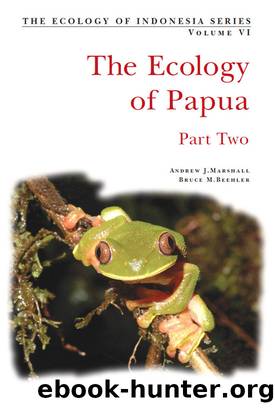Ecology of Indonesian Papua Part Two by Andrew J. Marshall & Bruce M. Beehler

Author:Andrew J. Marshall & Bruce M. Beehler [Marshall, Andrew J. & Beehler, Bruce M.]
Language: eng
Format: epub
Tags: nature, ecology, Travel, Asia, Southeast, Special Interest, Ecotourism, Ecosystems & Habitats, Forests & Rainforests, Regional
ISBN: 9781462906802
Google: IxDRAgAAQBAJ
Publisher: Tuttle
Published: 2012-06-26T20:28:58+00:00
Transfer of the Territory
For a number of reasons, ranging from Dutch nationalism, geopolitical considerations, and self-righteous moral convictions, to wanting to keep the territory for immigration (in particular for Eurasians from the Netherlands Indies), the Netherlands government resisted including West New Guinea in the negotiations for the independence of Indonesia in the late 1940s (see de Geus 1984; Gase 1984; van Galen 1984; Huydecoper van Nigtevecht 1990; Lijphart 1966; and Penders 2002). Around the same time, the Netherlands government set about economic and infrastructure development as well as, at later stages, political development of the Papuans under paternalistic guardianship. In the course of the 1950s, when tensions between the Netherlands and Indonesia grew over the status of West New Guinea, the Dutch began to guide a limited group of educated Papuans towards independence, culminating in the establishment of the New Guinea Council (Nieuw-Guinea Raad) in 1961. In addition, the Morning Star flag (Bintang Kejora) was designed to be flown beside the Dutch flag, and a national anthem, Hai Tanahku Papua, was adopted to be played and sung during official occasions after the Netherlands national anthem.
After a twelve-year dispute that was reaching its peak with the threat of open military conflict, this policy had to be aborted. With the threat of an Indonesian invasion and the unwillingness of the United States and Australia to support the Netherlands military forces, The Hague was forced to accept the Indonesian claim that it was the legitimate successor to the entire territory of the former Netherlands Indies. In December 1961, President Sukarno issued the Peopleâs Threefold Command (Trikora: Tri Komando Rakyat) for the liberation of Irian Barat (West Irian, now Papua). At the heart of this massive mobilization was Operasi Mandala, an Armed Forces of the Republic of Indonesia (ABRI: Angkatan Bersenjata Republik Indonesia) campaign designed to put pressure on the Netherlands government.
Following years of persistent but low-scale infiltration into Netherlands New Guinea that met limited support by Indonesia supporters among the Papuans, the Indonesian Air Force and paratrooper units readied themselves at East Indonesian airfields and ports such as Ambon (Maluku) and Makassar (South Sulawesi). The Mandala military authority, headed by Major General Suharto, had authority over the entire Eastern Indonesian war zone. Despite the impressive number of troops numbering 42,000, Operasi Mandala was chiefly a political instrument and did not have the capacity or the intention to invade West New Guinea. In fact, most troops of the Mandala force did not come into action. Nevertheless, Dutch defenses intensified over the last few years and were tested in January 1962 when three German-built Jaguar torpedo boats of the Indonesian Navy entered Dutch waters and were fired upon. One ship, the Macan Tutul, was sunk and the commander Yos Sudarso of the Indonesian Navy was killed (Vlasblom 2004: 314â315).
To avoid further confrontation and in an international climate of decolonization, and after President Sukarnoâs sustained pressing of Indonesiaâs claim to the territory, the United States sponsored negotiations between Indonesia and the Netherlands. While Indonesia dropped hundreds
Download
This site does not store any files on its server. We only index and link to content provided by other sites. Please contact the content providers to delete copyright contents if any and email us, we'll remove relevant links or contents immediately.
China Rich Girlfriend by Kwan Kevin(4558)
The Silk Roads by Peter Frankopan(4526)
Annapurna by Maurice Herzog(3464)
Full Circle by Michael Palin(3443)
Hot Thai Kitchen by Pailin Chongchitnant(3381)
Okonomiyaki: Japanese Comfort Food by Saito Yoshio(2715)
The Ogre by Doug Scott(2679)
City of Djinns: a year in Delhi by William Dalrymple(2552)
Photographic Guide to the Birds of Indonesia by Strange Morten;(2530)
Vietnam, Cambodia, Laos & Northern Thailand by Lonely Planet(2453)
Tokyo by Rob Goss(2427)
Tokyo Geek's Guide: Manga, Anime, Gaming, Cosplay, Toys, Idols & More - The Ultimate Guide to Japan's Otaku Culture by Simone Gianni(2363)
Everest the Cruel Way by Joe Tasker(2338)
Discover China Travel Guide by Lonely Planet(2222)
Iranian Rappers And Persian Porn by Maslin Jamie(2196)
China (Lonely Planet, 11th Edition)(2159)
China Travel Guide by Lonely Planet(2147)
Lonely Planet China(2141)
Top 10 Dubai and Abu Dhabi by DK Travel(2097)
